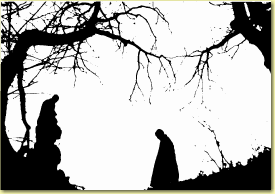Film review: Why Has Bodhidharma Left for the East
 “Why Has Bodhidharma Left for the East?” is Yong-Kyun Bae’s spellbinding, succulent commentary on the meaning of life.
“Why Has Bodhidharma Left for the East?” is Yong-Kyun Bae’s spellbinding, succulent commentary on the meaning of life.
Zen aficionados may relate to the Zen setting. A dying master, an adept, and a child live together in a mountain retreat.
Beyond the story or the message of this film, however, is the breathtaking cinematography. The director is said to have spent seven years planning the film in great detail, resulting in a “script” ten times longer than normal—then spent another three full years shooting the movie. The result is a visual feast of lush, compelling imagery. A trained painter and teacher of painting, Bae has created a film which is in itself a painting.
I lay no claim to any definitive interpretation of this film, but to me it spoke about the human being and the necessity of his relationship to society. Just to make sure we get the point, although the monastery is remote, Bae places a bustling city at the foot of the mountain. The old master is so uncomfortable in society that even the main monastery is too much for him; he retreats to an even more isolated hut deep in the mountains where he meditates with his back against frozen ice, hastening his decline. The adept leaves his blind, widowed mother in the slum of the city to selfishly pursue his own enlightenment. The child. an orphan whom the master brought back to his mountain retreat almost as a pet, is deprived of every normal childhood pleasure—in the mountains, he is missing not only ihs parents but his entire social context.
A major subtheme in the film is the boy accidentally killing a bird, which he then buries, later noticing that maggots are devouring its corpse. Far from being a symbol of a child learning about death and evanescence, this scene emphasizes how impoverished the boy’s environment was—one bird dying is literally the sum total of his emotional learning experience that he could have in such an isolated environment.
Although the film speaks within the context of Korea, I am sure, about the nature of our involvement with society as we grow or attempt to do so, the lessons it teaches us apply equally, or even more so, to the West.
Interestingly, the director makes reference to the West in his notes as quoted on the Milestone Films website :
The action takes place around a monastery where an old Zen master lives. The central interest of thiswork is absolutely not Zen in of itself — in effect, Zen assumes the role in this film of an environment of profound significance. I chose this setting because it is of great interest and beauty and is perfectly suited to express my search for life’s meaning.
The teachings of Zen Buddhism allowed the Far East to develop its own culture and esthetic, but Zen also influenced many Western thinkers. One can discover examples in existential philosophy (especially in the writings of Martin Heidegger), in the psychology of Carl Gustav Jung, in surrealist art and in contemporary music and art.
I am also deeply interested in Erich Fromm’s assertion that the way of Zen is in harmony with the goals of Western psychoanalysis — self-fulfillment. I am convinced that, contrary to the extremely rational methodology of psychoanalysis, Zen allows the discovery of the reality of things and the foundations of the soul.
The movie was chosen as “One of the Ten Best Films of All Time” by three international film critics in the 1993 “Sight & Sound” Critics’ Poll.

December 5th, 2005 at 11:47
Is this movie available to rent from somewhere like blockbuster?
April 14th, 2006 at 14:02
How do I rent or buy ‘Why has Bodidharma left for the East?’
January 5th, 2007 at 09:19
How can you feel you’re ready for such a magnificent, spellbinding film when you are not even yet enlightened enough to use Google to find it?:
http://www.amazon.com/Why-Has-Bodhi-Dharma-Left-East/dp/B0000203Z5